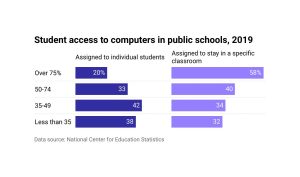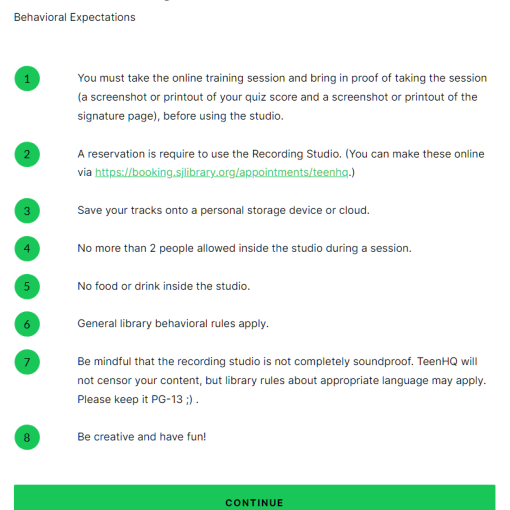Creative Computer & Information Literacy Learning in Elementary School Libraries: How Running an Ice Cream Truck Made Me a Better Citizen
Reflection Blogging: Weeks 11/12 – Infinite Learning (Learning Everywhere/Library As Classroom)
For this reflection, I decided to focus primarily on the Library As Classroom pathway for the Infinite Learning module. Working with young students, I found the entirety of this pathway so fascinating, especially those readings concerning the ways in which digital know-how is central to the modern school library. However, I will also touch on concepts addressed in the Learning Everywhere pathway, as well!

I want to begin this exploration by discussing some statistics about computer usage in school libraries and classrooms. According to this article from eSpark, students’ access to technology nowadays is both personalized and “ubiquitous”: “One-third of schools credited technology with helping their students become more independent, while similar shares said it helped students learn at their own pace and think critically” (2022).
The ALA also affirms that the presence of computers in school libraries can aid in learning and skill development specially because 1) students make connections between information access and academic success, and 2) the librarian is able to help students become more “effective users of information technology,” which further cements associations with effective research and student achievement (2004). I am putting these two articles in conversation with one another because the added presence of computers in the library do not necessarily equate to the success of students as information-seekers. Indeed, the former concedes, “Critics say however that there has not been enough focus on how computers in particular are used in the classroom” (eSpark, 2022), and some sources argue that the correlative relationship between computer usage and “educational results were ‘mixed at best’” (Sherman, 2015).
I argue that what defines the efficacy of learning in the media center relies predominantly on how it is facilitated. Access matters little to users without a practical understanding of the tools that grant it. As librarians, and therefore as custodians of information, it is our responsibility to implement technology in library spaces creatively to help young learners develop their own exploratory minds first and foremost, which begins with the fundamentals.
So, in the spirit of the Huffington Post article from this module, I want to provide a few great examples of how librarians are teaching how to use computers in unique ways in their libraries despite the popular notion that computer labs are a thing of the past:
1. Here is wonderful introductory video from Carrsville Elementary School’s teacher librarian, Lynn Taplin, that outlines how students are going to learn to become responsible digital citizens and develop coding and other computers skills in the resource center to “create animated stories and basic games online” (2020):
https://ces.iwcs.k12.va.us/apps/video/watch.jsp?v=288325
2. At the Ruby Bridges Elementary School in Alameda County, teacher librarian Ms. Warde helps students as young as Kindergartners learn the basics of coding using games from programs like Hour of Code.
https://rubybridges.alamedaunified.org/grade-levels/library-and-coding-lab
3. Students at Walnut Hill Elementary School in Omaha, Nebraska worked with their library media specialist Erin Solheim to learn how to be upstanding digital citizens by framing their lesson through the lens of superheroes (because students “have very strong opinions” about their favorites), and creating their own comic strips!
Indeed, an innovative computer lab is a huge boon for students developing critical skills in the information age. This thinkpiece from 2019, “5 Reasons Why School Computer Labs Still Matter,” computer labs are simply shifting to accommodate the changing prevalent pedagogical thought that emphasizes free-thinking and collaboration; and, despite this, “A computer lab by any other name… is still a computer lab… Increasingly, school libraries are less about stocking print materials and more about collaboration and creating meaning.” What media centers and libraries like the aforementioned are doing is simply refocusing efforts so that making and creating are at the heart of learning, creating a malleable space that reflects the fact that information is just as fluid and mobile.
It is now time for an anecdote. Twenty-ish years ago when I was these students’ age, we had a computer lab attached to the library like Taplin’s, and as a class would spend time with a dedicated media teacher who instructed us on how to use search engines and word processors; after the weekly lesson, we were given time to play typing and other educational games on the computers as a reward for being respectful and attentive. I specifically remember – and frequently reference whenever I hear The Entertainer by Scott Joplin – this one math and management game called Ice Cream Truck (2000), where you were given an ice cream truck and tasked with setting prices of your ice cream, decorating your truck, and deciding where to go throughout the day to sell your wares to the locals. Your profits were proportional to how strategic you were about selecting the ideal combination time and location; for example, you wouldn’t want to sell ice cream at the park before 3:00 p.m., because all the children are still in school. Your progress was logged into the computer you played on and you could return to your save file to peddle more frozen desserts the following week, if you so desired.
Thanks to the internet, I found that there is actually a playthrough of this game on YouTube!
I reference this game because it was so formative to my childhood as both a digital and a library citizen. Those whacking sound effects are intrinsically tied to how I was allowed to learn through play in the library space. I associate it, and therefore the library, strongly with enjoyment. The fact is that it was a downright fun game to play on one’s own that taught us the basics of research and correlation. Further still, it became a competition between the users of various grade levels assigned to the same computer, connecting students who may otherwise not have interacted at all to one another with a friendly learning-focused objective. This concept of togetherness generated by creative learning is outlined in the Heart of Librarianship: “There are examples from academic, public, and K–12 library spaces where community-learning spaces help people achieve, game-focused initiatives make the library a laboratory for exploration, and creation zones with requisite digital and 3-D hardware allow people to build things. There are potentially endless opportunities to connect virtually with people worldwide” (Stephens, pp. 127). In fact, I connected to a reddit community specifically through this post where user r/binaro was trying to remember the name of Ice Cream Truck: “I played this when I was in elementary school,” they report, “so that’s like around 9 or 10 years ago. In that very computer lab I also played other games like Gizmos and Gadgets” (2017) – just like me!
I want to conclude with a lovely TEDTalk video by librarian Linda Liukas. She discusses in her presentation how the “boring” and technical conception of computer science needs to actively be cast aside in favor of fostering the natural sense of creativity and enthusiasm in children learning about the limitless possibilities of coding. I think her ideas map very well onto the concept of the learning library, where exploration is spearheaded by the imaginations of our youngest users. As librarians it is our responsibility to respond to mold the library and its services into a space that not only actively – not passively – encourages students to develop this sense of wonder about the resources at their disposal – otherwise, she warns, “We are only raising consumers, instead of creators” (2016).
References
American Library Association (ALA). (2004). School library computers help with school work. https://www.ala.org/tools/research/librariesmatter/school-library-computers-help-school-work
binaro. (2017). [PC] {1990-2010] Ice cream truck game. [Online forum post]. Reddit. https://www.reddit.com/r/tipofmyjoystick/comments/692akm/pc19902010ice_cream_truck_game/
Bookey, J. L. (2015, April 29). 8 awesome ways libraries are making learning fun. Huffington Post. https://www.huffpost.com/entry/8-awesome-ways-libraries_b_7157462
Common Sense Education. (2020, March 13). Teaching digital citizenship: Be a super digital citizen. [YouTube Video]. https://www.youtube.com/watch?v=aUvO_0hBwbY
eSpark. (2022, September 8). How computer use in public schools has changed since 2009. https://www.esparklearning.com/blog/how-computer-use-in-public-school-classrooms-has-changed-since-2009/
LY203 Productions (Les Productions LY203). (2023, July 1). Ice Cream Truck (PC) gameplay. [YouTube Video]. https://www.youtube.com/watch?v=Af7tlVk5q9g
Ross, M. (2020, March 28). Gone are the days of computer labs. HonorsGradu. https://www.honorsgradu.com/gone-are-the-days-of-computer-labs/
Ruby Bridges Elementary School. (n.d.). Ruby Bridges Elementary School’s library mission statement. https://rubybridges.alamedaunified.org/grade-levels/library-and-coding-lab
Sherman, E. (2015, September 16). A warning about computers in the classroom. CBS News. https://www.cbsnews.com/news/a-warning-about-computers-in-the-classroom/
Stephens, M. (2016). Heart of librarianship. An imprint of the American Library Association.
Taplin, L. (2020, September 2). Welcome to library and computers! Carrsville Elementary School. https://ces.iwcs.k12.va.us/apps/video/watch.jsp?v=288325
TED. (2016, February 23). A delightful way to teach kids about computers | Linda Liukas. [YouTube Video]. https://www.youtube.com/watch?v=vcxwcWuq7KQ
ViewSonic. (2019, August 22). 5 reasons why school computer labs still matter. https://www.viewsonic.com/library/education/school-computer-labs-matter/


